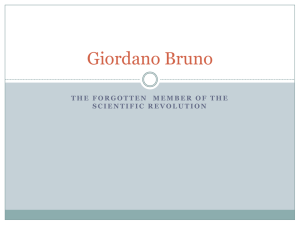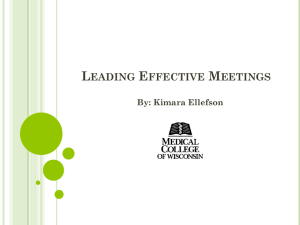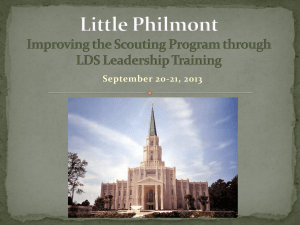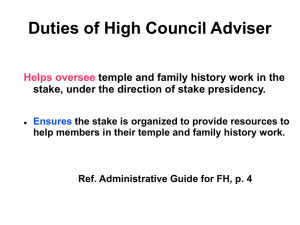Interest-Talk as Access Talk
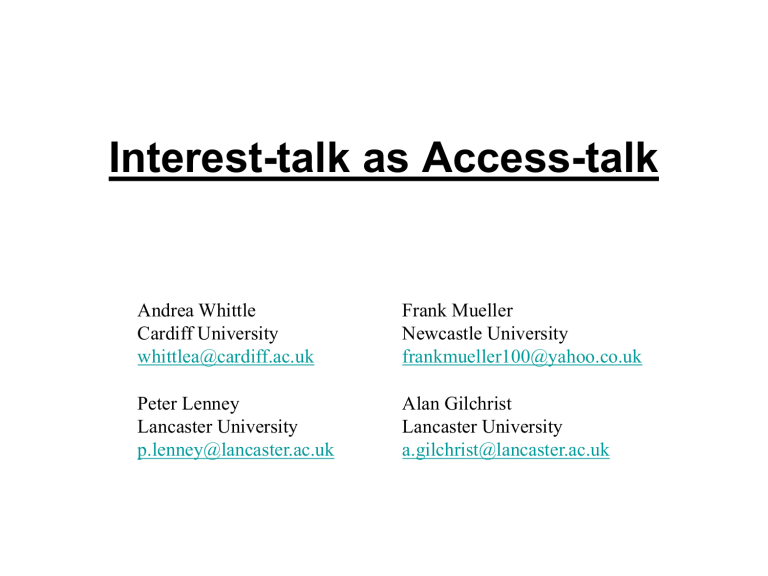
Interest-talk as Access-talk
Andrea Whittle
Cardiff University whittlea@cardiff.ac.uk
Peter Lenney
Lancaster University p.lenney@lancaster.ac.uk
Frank Mueller
Newcastle University frankmueller100@yahoo.co.uk
Alan Gilchrist
Lancaster University a.gilchrist@lancaster.ac.uk
Interested in Interests
• What do we mean by ‘interests’?
– More or less stable and more or less shared understanding that we have about:
• what we/they want,
• what stake we/they have in a particular situation,
• what we/they stand to (potentially) gain or lose from a particular course of action,
• what agenda we/they might have.
Interests as Research Problem
• Researchers face a very practical problem:
– Participants often have few good reasons to ‘let researchers in’, and many good reasons to ‘keep researchers out’
– Opposite can occur: research gets ‘co-opted’ into sectional agendas, political battles, legitimizing role (‘rubber stamping’) etc.
– Not a ‘one-off’ event at the beginning of the research (negotiation with key gatekeepers), part of an ongoing process of negotiation.
– Each participant will (understandably) want to know
• who the researcher is ,
• what they want ,
• who or what the research is for ,
• what their own stake is (what they might stand to gain or lose).
Classical Studies
• ‘
Identity
’ (fitting in, being ‘like them’ and ‘liked by them’)
– Get tattoos or taking drugs to ‘fit in’ with a gang?
…. Linked to ‘ interests
’ (I will not ‘snitch’ or damage your interests)
• Studies of gang culture: researcher required to undertake illegal activities (theft, drug taking etc) to ‘prove’ allegiance: “I am on your side”
• Humphreys (1970) became a “watch queen” - a lookout for the police or homophobic attackers for the purposes of his study of anonymous male sexual encounters in a public park in
Chicago.
•
Interests at forefront of organizational research
– instrumental repertoire?
Discursive Psychology
“The argument is not that social researchers should interpret people’s discourse in terms of their individual or group interests. There are all sorts of difficulties with such an analytic programme, not least of which is that it is very difficult to identify interests in a way that is separable from the sorts of occasioned interest attribution that participants use when in debate with one another . . . The argument here is that people treat each other in this way . They treat reports and descriptions as if they come from groups and individuals with interests, desires, ambitions and stake in some versions of what the world is like. Interests are a participants’ concern, and that is how they can enter analysis.”
(Potter, 1996: 110, emphasis in original)
DP does not deny that interests or motives exist (just as with other cognitive entities eg. emotions), rather it problematises the idea of a straightforward relationship between language and interests (i.e. language is driven by interests) and seeks to study empirically how people handle and manage notions of stake and interest.
Whittle, A. & Mueller, F. (2011) “The Language of Interests: The Contribution of Discursive Psychology” Human Relations 64(3): 415-435.
Term
Stake inoculation
Stake confession
Stake attribution
Stake construction
Definition
The discursive process through which people deny, or down-play, the notion that they have a stake, interest or motive in a particular argument or course of action.
The discursive process through which people handle actual or potential counter-arguments by admitting or “confessing to” having a particular stake, interest or motive.
The discursive process of ascribing (usually illegitimate) interests, stake and motive to other individuals or groups.
The discursive process through which people describe and shape a shared understanding of what (legitimate) interest, stake and motive an individual or group has , or should have .
Target/referent
Self
Self
Other
Other
Table 1 Definition of Four Discursive Strategies used to Manage Interest
The Study
• Ethnographic action research study of senior managers in multi-national company
Nature of fieldwork
Participant & non-participant observation of managers in non-formal settings
Duration
Continuous over a period of
30 months
Combination participant/non-participant observation of the
12 formal cross-functional Key Account Steering Group
Meetings
Full & ‘formal’ ‘work-shadowing’ observations
3-5 hours per meeting, over a 12 month period
Attendance of 17 “Steering Group” meetings (Key
Account Service/Plan Implementation cross-functional team meetings)
Interviews with Board Directors and Managers; including regular periodic interviewing of Steering Group members during the 12 months of its operation.
5-8 days in length of 2 marketing managers and 1 marketing director
1-2 hours per meeting, over a 12 month period
113 of 60-90 minutes each
Document capture: emails, meeting actions-arising notes/minutes, flip-chart work from meetings, presentations, planning documentation etc.
Continuous collection for duration of project
Our extract
Researcher:
“
So the first thing to emphasise is that
I’m not here as the consultant, right. This is free of charge. The – it’s a quid pro quo really I get access to FitCo research in return for me doing this.
Now
I’ve had lots of experience in doing this. I’ve worked with ConsultCo1,
ConsultCo2 [inaudible] and they all say the same thing and they all charge you
£1500 a day for something that they might have for breakfast.
So it is – I think this is a reasonably good deal for FitCo and it’s a great deal for me, right so it’s a quid pro quo.
So I’ve got no axe to grind right and the thing you’ve got to understand here is I’m here as a researcher, I’m going to help you like crazy and throw myself into it but if it doesn’t work and it goes wrong it’s as big a research opportunity for me as it if it goes right, so
I’ve no vested interests right, it’s a weird thing.
Except as my missus says
“that’s not like you, there’s no way you could be like that”. And she’s sort of right. So obviously I do want it to work but from a research point of view it doesn’t really matter, okay, yes.
So
I’m a bit of a mixed bag I’m not a classic consultant and I’m not a classic academic either. But as my mates in the pub say
“If that’s semi retirement you can keep it.
”
1
2
3
4
Extract Discursive strategy
I’m not here as the consultant, right.
This is free of charge.
The – it’s a quid pro quo really I get access to FitCo for research in return for me doing this.
Stake inoculation
Stake confession
Stake construction
Now
I’ve had lots of experience in doing this.
Stake construction
Formulation of stake, interest and motive
Claim to have no personal financial interest.
Claim to have a legitimate interest (access).
Claim that the participants have a legitimate interest
(something to gain from the research).
Claim that the participants have a legitimate interest
(something to gain from the research).
Claim that other parties have an illegitimate interest.
I’ve worked with
ConsultCo1, ConsultCo2
[inaudible] and they all say the same thing and they all charge you £1500 a day for something that they might have for breakfast.
Stake attribution
5 So it is – I think this is a reasonably good deal for
FitCo and it’s a great deal for me, right so it’s a quid pro quo.
Stake construction
Stake confession
6 So I’ve got no axe to grind right and the thing you’ve got to understand here is
I’m here as a researcher,
I’m going to help you like crazy and throw myself into it but if it doesn’t work and it goes wrong it’s as a bigger research opportunity for me as it if it goes right, so I’ve no vested interests right, it’s a weird thing.
Stake confession
Stake inoculation
Claim that the participants have a legitimate interest
(something to gain from the research).
Claim that the researcher has a legitimate interest.
Claim to have no predefined agenda or allegiances.
Claim to have no vested interest in commercial outcomes of research.
Claim to have a personal interest in commercial outcomes of research.
7 Except as my missus says
“that’s not like you, there’s no way you could be like that”.
And she’s sort of right.
So obviously I do want it to work but from a research point of view it doesn’t really matter, okay, yes.
8 So I’m a bit of a mixed bag
I’m not a classic consultant and
I’m not a classic academic either.
Stake confession
Stake inoculation
9 But as my mates in the pub says “If that’s semi retirement you can keep it.”
Stake inoculation
(
Claim to have a personal interest in the commercial outcomes of research, relating to identity (personality attributes, attitudes) etc. animator position )
Claim not to have ‘typical interests’ associated with either membership category
(consultant or academic) – distancing from possible damaging
‘interest’ assumptions of both categories
(eg. sell-on for consultants, possible lack of practical usevalue for academics, etc.).
Claim to have no personal gains to be derived from the research project – not to be envied for personal or financial benefits. ( animator position )
Sociology of Translation
How did scientists working on a polymer called DIMEVA attempt to publish their findings in the journal Cancer Quarterly?
Translation 1. Those interested in chemotherapy would be interested in
DIMEVA because it is thought to have chemotherapeutic qualities.
Translation 2. Your readership would therefore be interested in our research into how DIMEVA enters cells.
The
“Interests
Funnel”
Translation 3. You should publish our work on the DIMEVA polymer in Cancer Quarterly.
Callon, M., & Law, J. (1982). On Interests and their Transformation: Enrolment and Counter-Enrolment.
Social Studies of Science , 12 (4), 615-625.
Whittle, A., Suhomlinova, O. & Mueller, F. (2010). Funnel of Interests: The Discursive Translation of Organizational Change Journal of Applied Behavioral
Science Vol.46(1): 16-37
Convergence…
Translation 1. You want to make your business more profitable/successful/efficient etc
Translation 2. You want outside help, but don’t want to employ management consultants to help you.
Translation 3. You want someone with experience and expertise who can ‘make a difference’ but without a hefty price tag.
Translation 4. You want me! (and another PhD researcher…)
… Divergence
“What on earth is Researcher 1 up to? What are his motivations?”
“He’s not on the payroll, he’s a loose cannon, I’m not sure if we should trust him”
“He’s taking things too far, getting too involved.”
“Can you keep us updated on what he is up to?”
Researcher 1 viewed as threat to new Sales Director’s interests.
Researcher 2 as ‘watch queen’?
Conclusion
• Ethnography depends on convincing participants their interests are either furthered by researcher, or at least not threatened by them
• ‘Presentation of Self’ (identity) coupled with
‘Presentation of Stake’ (interests)
• Both researcher and participants can change understanding of interests during process of research
– Interests are not fixed entity but part of process of ongoing sensemaking: “made within the process itself” (Hernes & Maitlis,
2010: 27)
– We need to study how “interests are invoked, constructed and utilized” within social processes (Woolgar, 1981: 372).
Woolgar, S. (1981) “Interests and explanation in the social study of science.” Social Studies of Science11: 365-394
